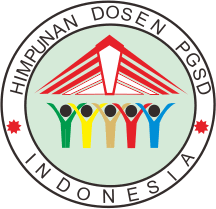Profil mi islamiyah kalipucang kulon dalam upaya meningkatkan kepercayaan orang tua melalui prestasi akademik dan non-akademik
Abstract
. This study aims to (1) analyze the efforts made by MI Kalipucang Kulon in increasing parental trust through the management and achievement of student academic achievement, (2) identify MI Kalipucang Kulon's strategies in increasing parental trust through the management and achievement of student non-academic achievement, and (3) reveal the obstacles faced by MI Kalipucang Kulon in increasing parental trust and providing relevant solutions to overcome these obstacles. The study was conducted at MI Kalipucang Kulon using a qualitative phenomenological approach. Data were collected through observation, interviews, and documentation. The results of the study showed that academic activities such as remedial and academic competitions, as well as non-academic activities such as drum bands, had a significant effect on parental trust. Obstacles such as miscommunication were overcome with effective communication and transparency. It was concluded that academic and non-academic activities play an important role in building parental trust. These findings provide a basis for developing strategies to increase parental trust in madrasahs.
Keywords
Full Text:
PDFReferences
[1] Alfauzan, M. D. (2016). "Peningkatan prestasi non akademik peserta didik dengan implementasi kurikulum 2013". 1–23.
[2] Baldy, M. Y. (2019). "Transparansi Dan Akuntabilitas Pengelolaan Dana Pendidikan Sekolah Muhammadiyah Kecamatan Tallo (Studi Kasus Mts. Muhammadiyah Syuhada)". 1–23.
[3] Deraman, D., Pabbajah, M., & Widyanti, R. N. (2022). "Respons Lembaga Pendidikan Islam Atas Implementasi Sistem Manajemen Mutu Pendidikan Nasional," Al-Iltizam: Jurnal Pendidikan Agama Islam, 7(1), 156–172. https://doi.org/10.33477/alt.v7i1.3051
[4] Dhiemas, N., Mubarok, D., & Marmoah, S. (2024). "Analisis Kemampuan Literasi Digital Guru pada Implementasi Kurikulum Merdeka di SD". Didaktika Dwija Indria, 12(4), 299–304.
[5] Huyler, D. (2022). "Research Design: Qualitative, Quantitative, and Mixed Methods Approaches, by John Creswell and J. David Creswell. Thousand Oaks", CA: Sage Publication, Inc. 275 pages, $67.00 (Paper... (Vol. 00, Issue July 2019). https://doi.org/10.1002/nha3.20258
[6] Khakim, N., Mela Santi, N., Bahrul U S, A., Putri, E., & Fauzi, A. (2022)."Penerapan Model Pembelajaran Problem Based Learning Dalam Meningkatkan Motivasi Belajar PPKn Di SMP YAKPI 1 DKI Jaya". Jurnal Citizenship Virtues, 2(2), 347–358. https://doi.org/10.37640/jcv.v2i2.1506
[7] Novitasari, R. A., Marmoah, S., & Budiharto, T. (n.d.). "Pelaksanaan intervensi digitalisasi sekolah pada program sekolah penggerak di sekolah dasar". Jurnal Didaktika Dwija Indria, 12(4), 449, 451–456.
[8] Ratnasari, L., & Suradika, A. (2020). "Di Kalangan Kelas Menengah Muslim Building Islamic School Reputation". Perspektif Komunikasi: Jurnal Ilmu Komunikasi Politik Dan Komunikasi Bisnis, 4(1), 21.
[9] Rostiana, N., Hanafi, M. S., & Sholih. (2022). "Pengaruh Supervisi Akademik Kepala Sekolah Dan Komunikasi Interpersonal Terhadap Kinerja Guru Sekolah Dasar". Jurnal Ilmiah Pendidikan Citra Bakti, 9(2), 468–477. https://doi.org/10.38048/jipcb.v9i2.705
[10] Sari, F. P. H., Atmojo, I. R. W., & Ardiansyah, R. (2023). "Pengaruh problem based learning berbantuan video animasi terhadap keterampilan berpikir kritis pada pembelajaran IPA kelas V SD se-kecamatan laweyan". JPI (Jurnal Pendidikan Indonesia): Jurnal Ilmiah Pendidikan, 8(4). https://doi.org/10.20961/jpiuns.v8i4.70966
[11] Sholikhah, M. (2021). "Pencitraan Publik Bagi Sekolah". INTIZAM : Jurnal Manajemen Pendidikan Islam, 4(2), 74–88. https://media.neliti.com/media/publikations/,
[12] Tika Nirmala Sari, N. P. (2020). "Dapatkah Kepemimpinan Kepala Sekolah, Motivasi Guru dan Kualitas Pelayanan Pendidikan Mempengharuhi Kepuasan Orang Tua Siswa". EduTech: Jurnal Ilmu Pendidikan Dan Ilmu Sosial, 6(1), 87–97. https://doi.org/10.30596/edutech.v6i1.4399
[13] Usman, Amaludin, R., Esita, Z., Idhayani, N., Rohmiyati, Risnajayanti, & Salma, S. (2023). "Analisis Proses Berpikir Siswa dalam Pemecahan Masalah Matematik Ditinjau dari Perbedaan Gaya Kognitif". Cendekia, 7(2), 2090–2103.
[14] Veloo, A., & Zolkepli, W. H. (2011). "Atribut Sistem Penilaian Prestasi dengan Kepuasan Kerja dalam Kalangan Guru". International Journal of Management Studies, 18(1), 197–216. https://doi.org/10.32890/ijms.18.1.2011.10207
[15] Wingen, T., Berkessel, J. B., & Englich, B. (2020). "No Replication, No Trust? How Low Replicability Influences Trust in Psychology". Social Psychological and Personality Science, 11(4), 454–463. https://doi.org/10.1177/1948550619877412


